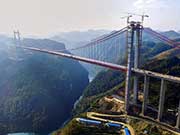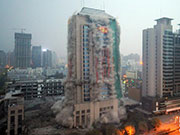

People excise on the street in smog at Runan County of Zhumadian, central China's Henan Province, Dec. 23, 2015. [Photo: Xinhua/Sun Kai]
China's Ministry of Environmental Protection has once again dispatched an inspection team to central China's Henan Province in order to make sure that factories that have been polluting the air have been shut down.
The latest round of inspections comes as about 50 cities in northern and eastern China have issued air pollution alerts because of smog in recent days.
The new round of inspections follow checks that were made earlier this month, in which inspectors found several factories emitting large amounts of pollutants in the city of Xinxiang, during the air pollution alert period.
This time, the inspectors found Yubei Chemical Ltd, one of the companies that had failed to pass the last inspection, had suspended its production.
City official Li Zhongyao says steps are being taken to cut pollution at its source.
"We have drawn inferences about other cases from one instance and checked the city's enterprises one by one. We will resolutely rectify problems once we find them."
Various measures have also been carried out in northern and eastern China as heavy smog lingers.
Shandong Province has now issued its first-ever red alerts in four cities, after warning that the density of PM2.5 would exceed 400 micrograms per cubic meter for more than 24 hours.
The alerts take effect this morning, limiting the number of vehicles on roads while also banning fireworks and outdoor barbecues. All construction sites will be closed. People are told to reduce outdoor activity and schools are expected to suspend classes.
A blue alert covering the whole province of Anhui, where five cities have had air quality index readings over 200 since Tuesday, has also been issued.
Hebei, home to six of China's ten "most polluted" cities in November, issued red alerts on Tuesday at noon. Tianjin saw its first red alert the same day, just as Beijing lifted its second red alert.
The Tianjin alert will expire today.
Wang Zifa, a researcher from the Chinese Academy of Sciences, says issuing red alerts can help prevent pollutant clusters.
"During the continuous heavy pollution period, if we can issue the alert or carry out measures early enough, we can largely reduce pollutant accumulation and lower its speed in the entire area. Take Beijing for example, pollutant is like a snowball. As time goes by, the snowball becomes bigger and bigger. If we can issue the alert earlier, the accumulation of the snowball can be slowed down, and the pollution will be effectively eased."
On Wednesday, the Ministry of Environmental Protection gave a preliminary assessment of the effects of recent emergency measures.
According to the ministry, Beijing cut pollutant emissions by 30 percent during its second red alert and neighboring cities emitted 25 percent less compared with ordinary days.
The ministry also named three organizations for environmental protection violations, pledging intensified supervision and heavier punishment for violators.
 |
Day|Week

 Spectacular aerial photos of the Three Gorges
Spectacular aerial photos of the Three Gorges Admit it! That is a High-way built by China
Admit it! That is a High-way built by China Photos of Beijing Film Academy student hit the Internet
Photos of Beijing Film Academy student hit the Internet Spectacular aerial photos of the Three Gorges
Spectacular aerial photos of the Three Gorges New balls please! Polish sports stars strip off for risqué calendar
New balls please! Polish sports stars strip off for risqué calendar A glance at life of Ukrainian models working in Chongqing
A glance at life of Ukrainian models working in Chongqing Contestants of Mrs. Globe pose for photo in Shenzhen
Contestants of Mrs. Globe pose for photo in Shenzhen
 Bikini models attend hot pot banquet in Hefei
Bikini models attend hot pot banquet in Hefei 118-meter-high Never-used Building in NW. China Demolished
118-meter-high Never-used Building in NW. China Demolished J-10B fighters with homegrown engine in test flight
J-10B fighters with homegrown engine in test flight